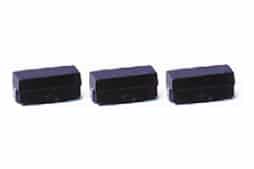The ZL70270, ZL70271, ZL70272, ZL70273, ZL70274, and ZL70288 from Zarlink Semiconductor make up a family of transient surge suppressing devices designed specifically for implanted medical devices. Five-, six-, and seven- terminal models are available. The device terminals exhibit extremely low leakage during normal voltages and can, therefore, be connected in parallel with the … [Read more...]
UK Researchers’ Terahertz Pulses Could Boost Medical Imaging Technology
Scientists at Britain’s University of Strathclyde have developed a technology for producing terahertz pulses—a safe form of radiation that could be used in medical imaging, biological research, or homeland security. The nanotechnology, developed by Dr Klaas Wynne and Gregor H. Welsh, can be used to cultivate a range of imaging technologies from new machines to detect cancerous … [Read more...]
Tumor Location System Uses EM Transponders for Targeted Cancer Treatment
The Calypso® 4D Localization System from Seattle, WA-based Calypso Medical Technologies is a proprietary tumor localization system that utilizes miniaturized implanted devices (Beacon® electromagnetic transponders) that continuously, accurately, and objectively pinpoint the location of tumors for improved accuracy in radiation therapy. This system addresses two major issues in … [Read more...]
New York State Company Offers Military-Approved QPL Inductors
Gowanda Electronics, of Gowanda, N.Y., has introduced a military-approved RF inductor series which is on the military’s Qualified Product List per MIL-PRF-83446. Gowanda’s MLRF3013 series addresses a need in the marketplace for enhanced RF inductor options in military applications. The MLRF3013 series is designed for RF electronic applications in military, aerospace and defense … [Read more...]
American Medical Association Policy Encourages Doctors to Learn About EMI
The American Medical Association’s new policy, H-215.972 Use of Wireless Radio-Frequency Devices in Hospitals, encourages collaborative efforts with the Food and Drug Administration and other organizations to develop consistent guidelines for the use of wireless devices in hospitals.Other collaborative efforts encouraged are the development of standards for medical equipment … [Read more...]
JAMA Publishes Story on Interference to Critical Care Medical Equipment from RFID Devices
The June issue of the Journal of the American Medical Association (JAMA) includes a paper on EMI tests carried out by a research team at the academic Medical Center, University of Amsterdam, Amsterdam, the Netherlands. Radio frequency identification devices have received considerable attention in the medical community since their use could readily identify patients accurately … [Read more...]
EMI Filters Are Available with Optional Surge Suppression
EMI filters modules from Foster Transformer are available with optional surge suppression. These devices can be mounted with ¼-inch quick connect terminals, a feature that allows them to be used wherever needed for EMI suppression—even in multiple locations within one piece of equipment. The fully encapsulated construction of these device complies with EN 133200 and UL 1283, … [Read more...]
Optic Rotary Encoder Targets Applications in MRI Units and Other Extreme EM Environments
The TD5207 from Micronor, a non-metallic fiber optic rotary encoder, has been designed especially for use in motion control systems operating in extreme electromagnetic fields. Medical diagnostic and research applications include MRI (magnetic research imaging) or NMR (nuclear magnetic resonance) tomography imaging systems. The encoder also serves as the control feedback … [Read more...]
Intertek Achieves Acceptance of Certification Marks from the United Arab Emirates
Intertek, well known for its EMI/RFI and other test offerings, has announced that its safety and certification marks have been formally accepted in the United Arab Emirates by the Dubai Civil Defense and Abu Dubai Civil Defense Departments. Intertek’s ETL and WHI marks acceptance provide manufacturers direct global market access to one of the fastest growing construction … [Read more...]
Crucial RF Shielding Selection Considerations
Gary Fenical Laird Technologies INTRODUCTION Designers must attenuate RF signals for various reasons. Since a product cannot be legally marketed unless it meets EMC requirements, designers must curtail RF signals above a certain limit. It is important to consider RF shielding materials at the beginning of a design project because choosing the correct kind of shielding upfront … [Read more...]













